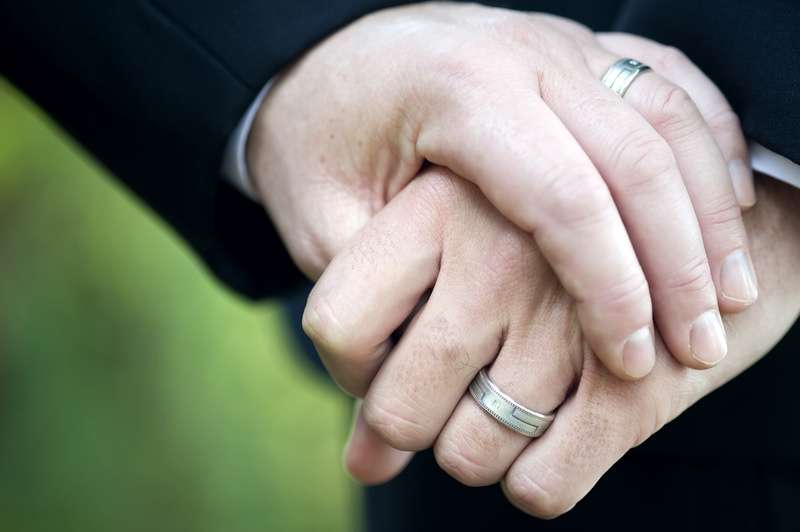Judge to Order Ohio to Recognize Other States' Gay Marriages


A federal judge in Ohio is warning the state in advance that he'll be ruling later in April that the state cannot refuse to recognize same-sex marriages performed legally in other states. The same judge had previously ruled the state must recognize same-sex marriages for the limited purpose of listing relationships in death certificates. Some of the headlines out there on this latest development are a bit problematic. The judge will not be requiring Ohio to issue marriage licenses to same-sex couples. Some headlines give the strong suggestion this is the case. Instead, like recent rulings in Tennessee and Kentucky, the judge is saying Ohio will have to recognize gay marriages from states like New York and California, which now issue licenses to gay couples. Chris Geidner at BuzzFeed notes:
This case, brought in February on behalf of Brittani Henry and Brittni Rogers, initially was about birth certificates, and being able to have parents' marriages recognized on them, but, per Friday's docket entry, the decision will be finding the recognition ban unconstitutional "under all circumstances."
Presuming the state will appeal this coming ruling as well, expected by April 14, the case would join the other Ohio recognition case, as well as Tennessee and Kentucky cases about marriage recognition and the Michigan case about full marriage equality in that state, on appeal before the 6th Circuit.
I noted earlier when a similar ruling was handed down in Tennessee that requiring states to recognize other states' gay marriages could ultimately bring about the end of gay marriage bans without the Supreme Court having to make a big, broad ruling.
Editor's Note: As of February 29, 2024, commenting privileges on reason.com posts are limited to Reason Plus subscribers. Past commenters are grandfathered in for a temporary period. Subscribe here to preserve your ability to comment. Your Reason Plus subscription also gives you an ad-free version of reason.com, along with full access to the digital edition and archives of Reason magazine. We request that comments be civil and on-topic. We do not moderate or assume any responsibility for comments, which are owned by the readers who post them. Comments do not represent the views of reason.com or Reason Foundation. We reserve the right to delete any comment and ban commenters for any reason at any time. Comments may only be edited within 5 minutes of posting. Report abuses.
Please to post comments


Brittani Henry and Brittni Rogers
That's gotta be awkward.
And woe betide you if you call brit- TAN-i, Brit-tin- i.
Does this set precedent CCW reciprocity?
I wish!
Of course it does, why wouldn't it?
Come on, you know why. Because, FYTW.
Cuz teh ghey marrudge is a fundamental right, whereas the right to keep and bear arms has no constitutional basis whatsoever.
My question exactly, sarc.
Also, what about professional licenses? Why do states refuse to recognize law, medicine, or whatever licenses issued in another state?
License Fees!
Insurance certifications?
Because marriage is a state, whereas a license is permission to do something.
So, a person who is married has entered into a legal arrangement, whereas a person who gets a CCW license is granted permission to carry a gun if they wish to.
So, let's say I get married in MA. I travel to VT for vacation. My new bride gets bitten by a moose, and the bite being very nasti, she is driven to the hospital.
Under the full faith and credit clause, the VT government must treat my MA marriage as being the equivalent of a VT marriage, meaning that if the hospital must give me the same consideration in the treatment of my bride as if we were VT residents.
The VT justice of the peace, on the other hand, is not required to honor a marriage license issued by the state of MA. If I show up saying that a clerk in Athol has issued me a marriage license, the justice of the peace in Westminster West can tell me and my fiance to pound sand rather than being under any obligation to marry us.
Is that the actual reasoning?
I would add that in states that allow recognition of gay marriages, there is no distinction between "gay married" and "regular married". You are just married. So how can another state recognize some MA married people and not others when there is no difference in their legal status as married people? Either you recognize marriages from other states or you don't.
Yep. This distinction is pretty common in contract law, where a condition may vest, and which then enables an action. Whether the condition vests may be dependent on one state's law, while the permissions associated with that condition may be subject to that of another.
Also, while this judge thinks he's being a renegade based on his decision, it should be noted that I am eating a deep dish pizza while commenting on H&R. Take that, your honor!
Deep dish is not pizza.
Admit it, you are from Saint Louis, aren't you?
And NY style is not "pie" but that doesn't stop pompous east coasters from referring to their cardboard covered in tomato sauce as "pie".
pie
noun
1. a baked food having a filling of fruit, meat, pudding, etc., prepared in a pastry-lined pan or dish and often topped with a pastry crust: apple pie; meat pie.
2. a layer cake with a filling of custard, cream jelly, or the like: chocolate cream pie.
3. a total or whole that can be divided: They want a bigger part of the profit pie.
4. an activity or affair: He has his finger in the political pie too.
5. pizza.
COLLOQUIAL USES ARE NOT DEFINITIONAL!!!!11!!!!
No, actually my preferences are the right ones and you can all suck it.
Awesome alt-text.
As to the topic at hand, it is a corner case. FedGov has the power to do this, I'll agree -- but only when it's exercised by the legislature and ratified by the executive. As far as I know, the only thing that's come down the pike from the legislature on this issue is DOMA, therefore this is an inappropriate intrusion on the part of the court system.
Another thought: does this ruling also apply to states which allow marriages between cousins? AFAIK, states are allowed to admit other states' cousin-marriages based on their own standards.
Asking for a friend?
He's seen le Cousins Dangereux like 20 times. He even owns the inferior American remake on DVD.
FedGov has the power to do this, I'll agree
Which of the enumerated powers are you looking at? Because I'm not seeing it.
I would argue that under the 14th Amendment, Congress could mandate that all marriages between two (and currently only two) adults must be recognized by any state that recognizes any marriages. However, I do not believe they have done so, even after giving up their defense of the DOMA.
You could also argue for Article 4, Section 1, as this would be a "public act."
That's what I assumed.